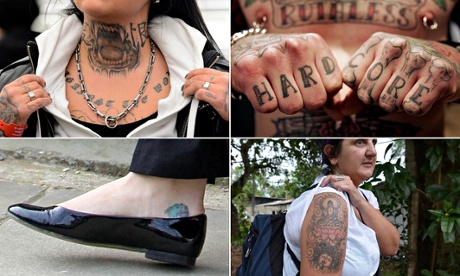
MI5 certainly knows how to write a job description. New surveillance officers can look forward to “sitting for substantial periods of time” and “long spells of inactivity”, to say nothing of the “limited promotion opportunities”. Anyone still interested should know the jobs are closed to those with tattoos on the face, neck or forearm, which are likely to make them more identifiable. In a world where even the Tory prime minister’s wife has been gunned with an ankle dolphin, you might think that an absence of ink was more identifiable than a lack of it. But here are some areas in which having tattoos can still cause problems.
Do you want Darth Maul as your lawyer?
Like horse racing and smoking, tattoos are a kind of wormhole between the aristocracy and the working classes, and it is at the upper and lower ends of the services industries that visible ink is most of a problem. No law firm or hedge fund wants to send Darth Maul to meet a client, and nobody wants to be served a Big Mac by QueeQueg. Or so the thinking has traditionally gone. In reality, many organisations are becoming more relaxed. In October 2014, the British Army permitted tattoos on the back of the neck and the hands, two areas where they had previously been banned. “However, if tattoos are visible on a passport photo they will still be deemed unacceptable,” they added. In the same month, in America, Starbucks relaxed its dress code in response to an employee-led petition, allowing tattoos to be shown provided they are not on the face or neck. The Metropolitan police, by comparison, only banned visible tattoos in 2012, and primary school teachers, as role models, must still cover up.
Cover up – or have your holiday ruined
Around the world, tattoos have the potential to be sensitive. In Japan they have a rich artistic history, but also a long association with the Yakuza, Japan’s equivalent of the mafia, which means that some public areas (such as swimming baths) have a “no tattoo” policy which may be extended to foreigners. In 2012, the singer Erykah Badu was banned from performing in Malaysia because of a tattoo containing the Arabic for Allah, which the authorities deemed offensive. And last April a British woman was deported from Sri Lanka because of a prominent tattoo of Buddha on her arm.
Forget about swimming or a tan
More boringly, tattoos have a short-term impact on what you can do. Sunbeds (and bright sunshine) are out for a few weeks, as is any long immersion in water (although getting it wet is fine). If you can’t keep the tattoo out of the sun for the first month or so, you should coat it in an Irish-child grade of sun cream. If you want a new design before you go and hang out with Sam Cam in Ibiza, in other words, you need to get a wiggle on. You also can’t give blood for four months, and bone marrow donors are advised to wait for up to a year.
Tattoos in 2015, then: a whole load of admin. But would you still get inked? Let us know in the comments below.

